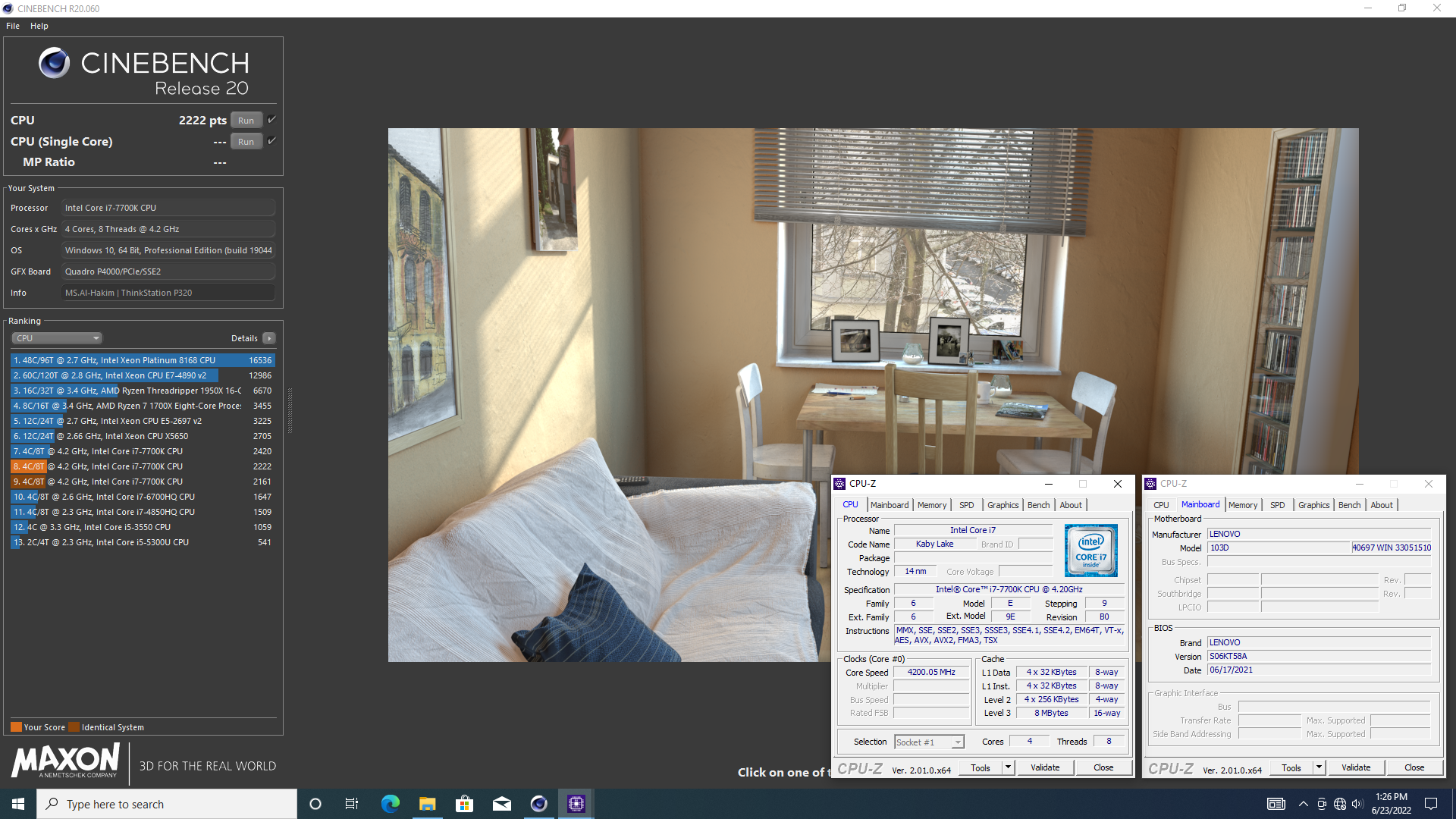Cinebench - R20 score 2222 pts with a i7-7700K
Thursday, 01 January 1970 07:00 | Update at null
Media Gallery
Screenshot

Device, Setup, etc

URL
https://hwbot.org/submission/5024388https://www.facebook.com/hakimnu.id/posts/3315916448640995
Information Detail
Hardware: Intel Core i7 7700K
Specs:CPUID : Intel(R) Core(TM) i7-7700K CPU @ 4.2GHz
Architecture : x86
Codename : Kaby Lake
L3 Cache : 8MB
Clock : 4.2GHz - 4.5GHz
Core/Thread : 4/8
TDP : 91W
Technology : 14nm
Socket : LGA1151
IGPU : Intel HD Graphics 630
See more specification...
Software: Cinebench - R20
Score: 2222 pts
About: Cinebench - R20Cinebench R20 is one of the most popular CPU benchmarks developed by Maxon, the company behind the professional 3D animation software Cinema 4D. This benchmark is designed to test processor performance in complex photorealistic rendering scenarios, utilizing the latest rendering engine from Cinema 4D Release 20. Cinebench R20 provides a more demanding and realistic test compared to previous versions like R15, making it a relevant benchmark for modern systems and processors.
In this test, the system is designed to render a high-quality 3D scene that utilizes various advanced rendering techniques, such as global illumination, area shadows, physical materials, and full CPU utilization down to the smallest cores and threads. Cinebench R20 requires more memory, processing power, and longer render times, providing a more accurate representation of a processor's real-world performance, especially in demanding tasks like rendering, video editing, and 3D simulation.
Unlike previous versions, Cinebench R20 does not include GPU/OpenGL testing, so its primary focus is purely on the CPU's ability to handle multi-threaded workloads. The resulting scores are presented in points (pts), where higher values indicate the CPU's ability to complete rendering processes faster and more efficiently. This is crucial for content creators, designers, and professional users looking to select the best CPU for their productivity needs.
Cinebench R20 has become an industry standard for reviewers, overclockers, and technicians in objectively and consistently testing CPU performance. With workloads that reflect real-world scenarios and optimizations for modern processors, this benchmark remains one of the most important tools for evaluating and comparing system performance in depth.
The Intel Core i7-7700K, launched in early 2017, is a high-performance desktop processor from the 7th generation Kaby Lake family. Built on the 14nm process, the i7-7700K features 4 physical cores and 8 threads, thanks to Hyper-Threading Technology, and is targeted at enthusiasts, gamers, and power users. It operates at a base frequency of 4.2 GHz and can boost up to 4.5 GHz via Intel Turbo Boost, delivering excellent single-threaded performance one of the highest at the time of its release.
As part of Intel’s “K” series, the Core i7-7700K has an unlocked multiplier, making it ideal for overclocking on compatible Z-series motherboards. However, with a TDP of 91W, the processor demands an effective cooling solution, especially when overclocked beyond its stock speeds. Users typically pair this CPU with aftermarket air or liquid coolers to ensure thermal stability under heavy workloads or gaming sessions.
The processor includes Intel HD Graphics 630, which supports 4K output at 60Hz and is sufficient for basic tasks like web browsing, video playback, and office work. However, for serious gaming or GPU-accelerated workloads, a discrete graphics card is still necessary, especially when paired with a high-refresh-rate monitor or demanding software.
In terms of real-world performance, the i7-7700K remains capable even today for 1080p and 1440p gaming, general productivity, and creative tasks. It delivers solid frame rates in many modern titles when used with a modern GPU, and it handles applications like Adobe Photoshop, Premiere Pro, and coding environments reasonably well. However, due to its limited core count by today’s standards and lack of PCIe 4.0 support, it has started to show its age in multi-threaded and next-gen workloads.
Despite being surpassed by newer Intel and AMD CPUs with more cores and better efficiency, the i7-7700K still holds value in many mid-range desktop setups, especially for users who already own an LGA 1151 system and want to maximize performance without a full platform upgrade.
* Not Avaiable
